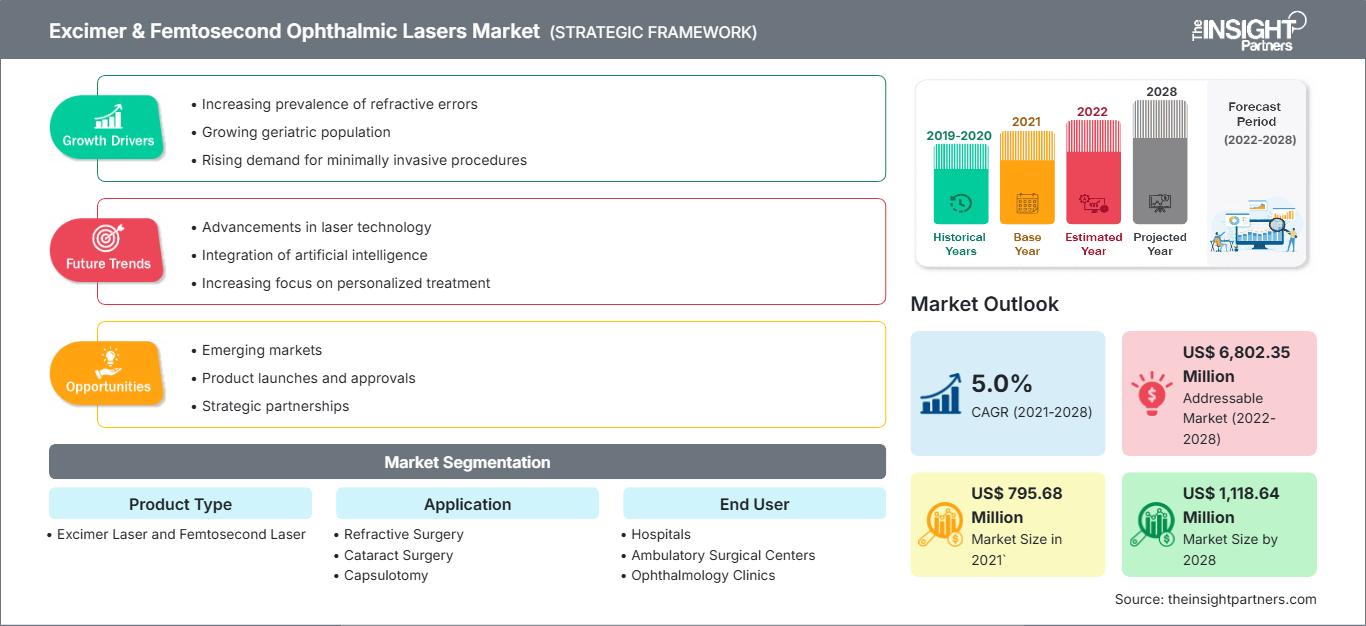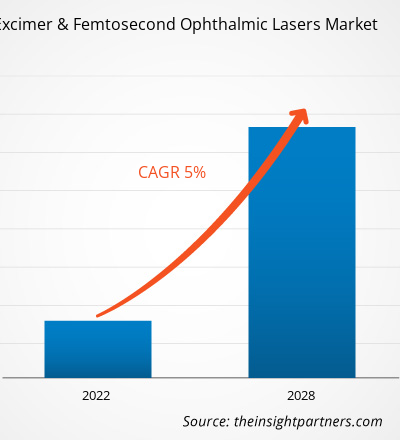Si prevede che il mercato dei laser oftalmici a eccimeri e femtosecondi raggiungerà i 1.118,64 milioni di dollari entro il 2028, rispetto ai 795,68 milioni di dollari del 2021; si stima una crescita a un CAGR del 5,0% nel periodo 2021-2028.
Copertura del rapporto
La crescita del mercato dei laser oftalmici a eccimeri e femtosecondi è attribuita a fattori quali l'aumento della popolazione anziana e l'aumento del numero di interventi di cataratta e refrattivi. Tuttavia, l'elevato costo degli interventi chirurgici e dei dispositivi oftalmici ostacola la crescita del mercato.
Personalizza questo rapporto in base alle tue esigenze
Potrai personalizzare gratuitamente qualsiasi rapporto, comprese parti di questo rapporto, o analisi a livello di paese, pacchetto dati Excel, oltre a usufruire di grandi offerte e sconti per start-up e università
Mercato dei laser oftalmici ad eccimeri e femtosecondi: Approfondimenti strategici

-
Ottieni le principali tendenze chiave del mercato di questo rapporto.Questo campione GRATUITO includerà l'analisi dei dati, che vanno dalle tendenze di mercato alle stime e alle previsioni.
Approfondimenti di mercato
Aumento significativo della popolazione anziana
L'aumento della popolazione geriatrica in paesi come Stati Uniti, Regno Unito, Canada, Giappone, Cina, India e Corea del Sud è trainato dalla modernizzazione delle strutture sanitarie e dal miglioramento dei servizi sanitari, che aumenta l'aspettativa di vita in questi paesi. Secondo i dati dell'OMS di febbraio 2018, si stima che la popolazione geriatrica aumenterà dal 12% del 2015 al 22% entro il 2050. Secondo l'Ufficio del censimento degli Stati Uniti, si prevede che il numero di persone negli Stati Uniti di età pari o superiore a 65 anni aumenterà da 46 milioni nel 2016 a oltre 98 milioni entro il 2060, mentre la loro quota di popolazione crescerà da circa il 15% a circa il 24% durante questo periodo. Secondo il rapporto delle Nazioni Unite sull'invecchiamento della popolazione mondiale 2017, nel 2017 l'Europa aveva la percentuale più alta al mondo (ovvero il 25%) di persone di età superiore ai 60 anni. Inoltre, entro il 2050, tutte le regioni del mondo, ad eccezione dell'Africa, avrebbero avuto circa il 25% o più della loro popolazione di età pari o superiore a 60 anni, e i paesi sottosviluppati e in via di sviluppo avrebbero rappresentato circa l'80% di questa crescita.
La perdita della vista è un grave problema di salute tra gli anziani. Degenerazione maculare senile, glaucoma, cataratta e retinopatia diabetica sono tra le cause più comuni di perdita della vista tra le persone di questa fascia d'età. La degenerazione maculare senile provoca la perdita della visione centrale. Lesioni del nervo ottico e perdita del campo visivo possono verificarsi a seguito di glaucoma primario ad angolo aperto. Poiché questa malattia può essere inizialmente asintomatica, le persone anziane necessitano di controlli regolari. Sebbene la cataratta sia la causa comune di problemi visivi in queste persone, può solitamente essere rimossa chirurgicamente. La retinopatia diabetica è comune anche tra gli anziani durante le fasi iniziali del diabete o al momento della diagnosi. Quando a un paziente viene diagnosticato il diabete, si raccomanda un esame midriatico, seguito da una visita annuale.
Secondo l'American Institute of Ophthalmology, circa 24,4 milioni di persone di età inferiore ai 40 anni si sottopongono a intervento di cataratta e circa il 5% di tutti gli americani si sottopone a intervento di cataratta entro i 75 anni. Inoltre, i casi di glaucoma sono in aumento e la condizione colpisce oltre 2,7 milioni di americani di età pari o superiore a 40 anni. Nuove malattie oculari, come la degenerazione maculare legata all'età, che colpisce oltre 2,1 milioni di americani di età pari o superiore a 50 anni, possono causare una grave perdita della vista. Pertanto, si registra un'adozione significativamente elevata di nuove tecnologie, come i laser a femtosecondi, nella chirurgia della cataratta, che comportano un ingente investimento iniziale ma promettono miglioramenti nei risultati per i pazienti. Pertanto, l'aumento della popolazione geriatrica alimenta la crescita del mercato dei laser oftalmici a eccimeri e a femtosecondi.
Approfondimenti basati sulla tipologia di prodotto
In base alla tipologia di prodotto, il mercato dei laser oftalmici a eccimeri e a femtosecondi è segmentato in laser a eccimeri e laser a femtosecondi. Si prevede che il segmento dei laser a femtosecondi guiderà il mercato nel 2021 e manterrà la sua posizione dominante tra il 2021 e il 2028. Inoltre, si prevede che lo stesso segmento crescerà al ritmo più rapido nei prossimi anni.
Approfondimenti basati sull'applicazione
In base all'applicazione, il mercato dei laser a eccimeri e a femtosecondi è segmentato in laser a eccimeri e laser a femtosecondi. Il mercato dei laser oftalmici a femtosecondi è segmentato in chirurgia refrattiva, chirurgia della cataratta, capsulotomia, trabeculoplastica e diagnostica. Si prevede che il segmento della chirurgia refrattiva deterrà la quota di mercato maggiore nel 2021, mentre si stima che il segmento della chirurgia della cataratta registrerà il CAGR più elevato del mercato durante il periodo di previsione.
Approfondimenti basati sull'utente finale
In base all'utente finale, il mercato dei laser oftalmici a eccimeri e a femtosecondi è segmentato in ospedali, cliniche oftalmiche e centri chirurgici ambulatoriali. Si stima che il segmento ospedaliero deterrà la quota di mercato maggiore nel 2021. Tuttavia, si stima che il segmento delle cliniche oftalmiche registrerà il CAGR più elevato del mercato durante il periodo di previsione.
Il lancio e l'approvazione di prodotti sono le strategie comunemente adottate dalle aziende per espandere la propria presenza globale e il proprio portafoglio prodotti. Le aziende del mercato dei laser oftalmici a eccimeri e femtosecondi si concentrano sulla strategia di collaborazione per ampliare la propria clientela, il che, a sua volta, consente loro di mantenere il proprio marchio in tutto il mondo.
Mercato dei laser oftalmici ad eccimeri e femtosecondi
Le tendenze regionali e i fattori che influenzano il mercato dei laser oftalmici a eccimeri e femtosecondi durante il periodo di previsione sono stati ampiamente spiegati dagli analisti di The Insight Partners. Questa sezione illustra anche i segmenti e la geografia del mercato dei laser oftalmici a eccimeri e femtosecondi in Nord America, Europa, Asia-Pacifico, Medio Oriente e Africa, America Meridionale e Centrale.
Ambito del rapporto di mercato sui laser oftalmici a eccimeri e femtosecondi>
| Attributo del rapporto | Dettagli |
|---|---|
| Dimensioni del mercato in 2021` | US$ 795.68 Million |
| Dimensioni del mercato per 2028 | US$ 1,118.64 Million |
| CAGR globale (2021 - 2028) | 5.0% |
| Dati storici | 2019-2020 |
| Periodo di previsione | 2022-2028 |
| Segmenti coperti |
By Tipo di prodotto
|
| Regioni e paesi coperti |
Nord America
|
| Leader di mercato e profili aziendali chiave |
|
Densità degli operatori del mercato dei laser oftalmici a eccimeri e femtosecondi: comprendere il suo impatto sulle dinamiche aziendali
Il mercato dei laser oftalmici a eccimeri e femtosecondi è in rapida crescita, trainato dalla crescente domanda degli utenti finali, dovuta a fattori quali l'evoluzione delle preferenze dei consumatori, i progressi tecnologici e una maggiore consapevolezza dei vantaggi del prodotto. Con l'aumento della domanda, le aziende stanno ampliando la propria offerta, innovando per soddisfare le esigenze dei consumatori e sfruttando le tendenze emergenti, alimentando ulteriormente la crescita del mercato.

- Ottieni il Mercato dei laser oftalmici ad eccimeri e femtosecondi Panoramica dei principali attori chiave
Mercato dei laser oftalmici a eccimeri e femtosecondi - per tipo di prodotto
- Laser a femtosecondi
- Laser a eccimeri
Mercato dei laser oftalmici a eccimeri e femtosecondi - per applicazione
- Chirurgia refrattiva
- Chirurgia della cataratta
- Capsulotomia
- Trabeculoplastica
- Diagnostica
Mercato dei laser oftalmici a eccimeri e femtosecondi - per utente finale
- Ospedali
- Cliniche oftalmiche
- Centri chirurgici ambulatoriali ... Mercato dei laser oftalmici a femtosecondi: per area geografica
- Nord America
- Stati Uniti
- Canada
- Messico
- Europa
- Francia
- Germania
- Italia
- Regno Unito
- Spagna
- Resto d'Europa
- Asia Pacifico (APAC)
- Cina
- India
- Corea del Sud
- Giappone
- Australia
- Resto dell'Asia Pacifico
- Medio Oriente e Africa (MEA)
- Sudafrica
- Arabia Saudita
- Emirati Arabi Uniti
- Resto del Medio Oriente e Africa
- America Meridionale e Centrale (SCAM)
- Brasile
- Argentina
- Resto di America meridionale e centrale
Profili aziendali
- Bausch Health Companies Inc.
- Alcon Inc.
- ZEISS International
- NIDEK CO., LTD
- IVIS TECHNOLOGIES
- EXCELSIUS MEDICAL GMBH
- Ziemer Ophthalmic Systems
- SCHWIND SOLUZIONI-TECH-OCCHIALI
- LENSAR, Inc.
- NKT Photonics A/S
- Nord America
- Analisi storica (2 anni), anno base, previsione (7 anni) con CAGR
- Analisi PEST e SWOT
- Valore/volume delle dimensioni del mercato - Globale, Regionale, Nazionale
- Industria e panorama competitivo
- Set di dati Excel
Report recenti
Rapporti correlati
Testimonianze
Motivo dell'acquisto
- Processo decisionale informato
- Comprensione delle dinamiche di mercato
- Analisi competitiva
- Analisi dei clienti
- Previsioni di mercato
- Mitigazione del rischio
- Pianificazione strategica
- Giustificazione degli investimenti
- Identificazione dei mercati emergenti
- Miglioramento delle strategie di marketing
- Aumento dell'efficienza operativa
- Allineamento alle tendenze normative






















 Ottieni un campione gratuito per - Mercato dei laser oftalmici ad eccimeri e femtosecondi
Ottieni un campione gratuito per - Mercato dei laser oftalmici ad eccimeri e femtosecondi